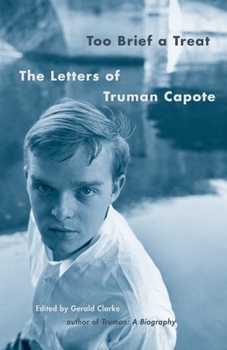Too Brief a Treat: The Letters of Truman Capote
Select Format
Select Condition 
Book Overview
The private letters of Truman Capote, lovingly assembled here for the first time by acclaimed Capote biographer Gerald Clarke, provide an intimate, unvarnished portrait of one of the twentieth century's most colorful and fascinating literary figures. Capote was an inveterate letter writer. He wrote letters as he spoke: emphatically, spontaneously, and passionately. Spanning more than four decades, his letters are the closest thing we...
Format:Paperback
Language:English
ISBN:0375702415
ISBN13:9780375702419
Release Date:September 2005
Publisher:Vintage
Length:512 Pages
Weight:0.86 lbs.
Dimensions:0.9" x 5.4" x 8.3"
Customer Reviews
3 ratings
Better than a diary!
Published by Thriftbooks.com User , 17 years ago
When you read personal correspondence written to friends, lovers, and business associates . . . well, it doesn't get any better! Candid, un-censored, witty, funny, revealing, cutting . . . it's all there! A great look at the true Truman Capote. Very interesting.
Too Much Of A Good Thing
Published by Thriftbooks.com User , 18 years ago
I always loved Truman Capote's writing and looked forward to this book oh, so much, especiallywhen I saw it was edited by the estimable Gerald Clarke, who has written so brilliantly on Capote in his biography (and who also wrote GET HAPPY, a terrific life of Judy Garland). (Hmmm, he must specialize in the tiny.) But alas Capote's letters just aren't as good as his fiction. They seem hurried, scattered, as though he were writing too fast to revise, everything exactly the opposite of what one likes about the stories and filmscripts. I will say you do get a different side of him, and the outlines of his social world become clearer, so view this compilation as an addendum to the biography, and you won't go far wrong. I was surprised to see him make so much of (i.e. flatter) Cecil Beaton, it sounded phony. It seems that he treated Newton Arvin pretty well all things put together. Some have said that he "used" Arvin to get ahead and then dumped him once he had found a measure of his own success. But Arvin can't have been an easy guy to live with IMHO. Another interesting correspondent is William Goyen. I think the best letter in all of TOO BRIEF A TREAT is Capote's letter congratulating Goyen on the achievement of THE HOUSE OF BREATH. That letter, in the perfection of its phrases and the conviction of its rapture, is alone worth the price of the book. It's a shame that Goyen later turned on Capote and treated him so shabbily. Good for Gerald Clarke for pointing this out. Meanwhile the good news for Capote fans is that his novel SUMMER CROSSING, about which many of the letters to Bob Linscott are devoted, has been recovered and now, fifty-plus years later, it might be seeing the light of day. In the interim we will re-read these letters, hoping to scan in more data on the terrific catastrophe that was Truman Capote's life.
A book for fans of the genre and of the man
Published by Thriftbooks.com User , 19 years ago
"Your letter was too brief a treat, but a treat all the same; there is only one excitement to my day, and that is when the postman comes." So wrote the author who sometimes waited an hour for the best word to come to mind when engaged in concocting a novel, yet spun off letters to friends and colleagues like cotton candy. Truman Capote, to whom fame came early and lasted long, called all of his correspondents by such adorations as "precious baby, darling child." To almost anyone he was likely to say, "much love, little blue eyes" or "I miss you 24 hours of the day" or "a thousand kisses, precious." It seemed that nearly everyone he wrote to was his darling, his love, and wanted showering with kisses. Not that he couldn't be cutting and catty, though always with gentility, at least on paper: "I'm afraid he's set fire to too many bridges"; "he's furious because anyone other than himself is here" (of W.H. Auden); and, of Jimmy (James) Baldwin, "his essays are at least intelligent, though they almost invariably end on a fakely hopeful, hymn-singing note." Of his early work on IN COLD BLOOD he wrote, "This is my last attempt at reportage." Like almost every writer, he wanted to know what the critics were really thinking and get copies of all his reviews. He managed to sound both humble and very puffy when referring to his successes, and terribly anxious about the fate of pieces in progress. A collection of so very many letters (for that is all the book is) can start to feel water-logged after a while. It's a good thing to recall that posterity will not necessarily be fascinated by one's complaints about the cold, the prices of goods in foreign cities, or the antics of one's pets (and Truman had many). We would all make our letters more artistic and succinct if we imagined that they'd be read generations hence. So we can speculate on two forking probabilities. One: that Capote well knew that his words would be taken for gemstones ages from now and wrote with the cagey casualness of the omniscient observer. Two: that Capote never imagined for an instant that anyone would collect his letters to friends and place them on the altar of memory for the entire world to see. I prefer the second alternative, because I like thinking of Capote as a natural, sweet-hearted man, who showed his artistic brilliance to the public but saved his syrup and a touch of spice for his epistolary relationships. TOO BRIEF A TREAT is a book for fans of the genre and of the man. --- Reviewed by Barbara Bamberger Scott, author of WITH IT: A Year on the Carnival Trail





